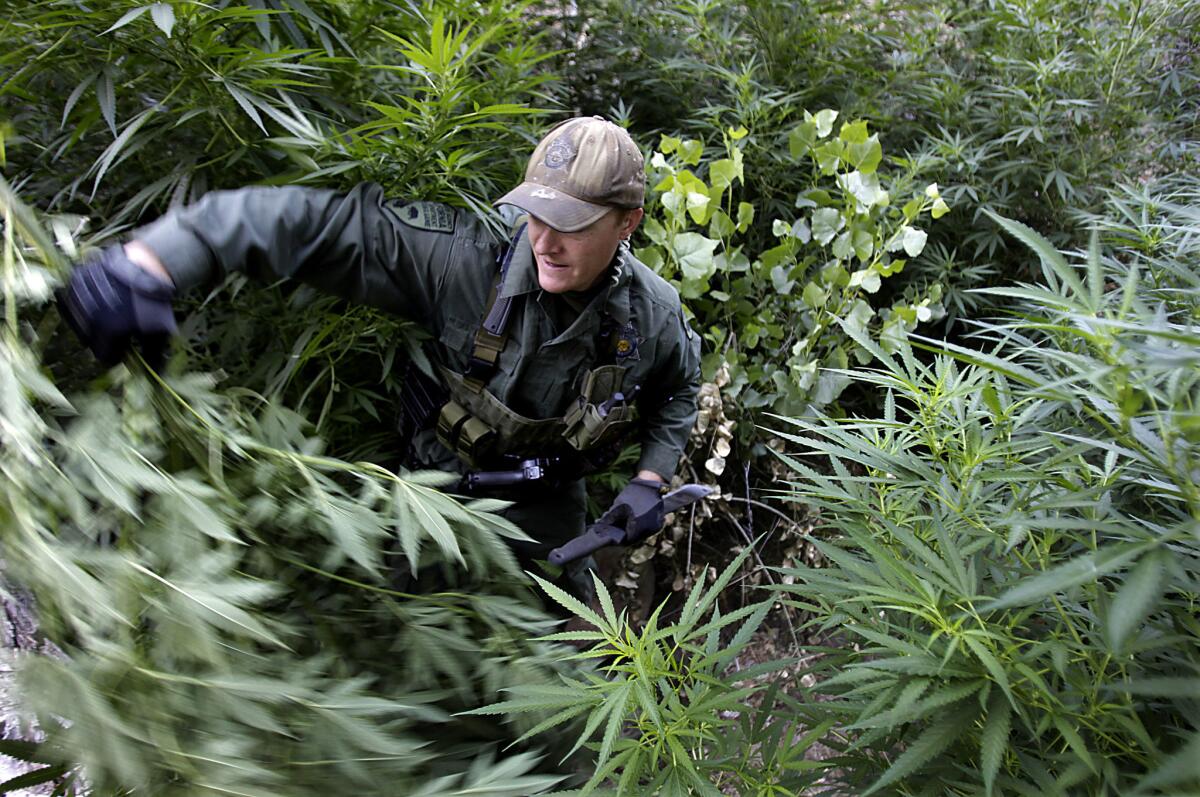Gov. Jerry Brown signs law targeting illegal marijuana grows

A warden with the California Department of Fish and Wildlife hacks down pot plants found growing in a deep ravine in the Sierra Nevada foothills near Kernville.
Reporting from Sacramento — Gov. Jerry Brown on Friday signed into law a measure allowing steep civil fines against marijuana farms that damage the environment by dumping wastewater and chemicals, removing trees and killing wild animals.
The measure, one of 16 bills signed by the governor Friday, is meant to expand the powers of the state Department of Fish and Wildlife at a time when illegal marijuana operations are expanding significantly.
Sen. Bill Monning (D-Carmel) introduced the measure based on concern that since California voters approved medical marijuana use in 1996, the number of illegal growing operations in state parklands and forests has increased.
Last year, state agents participated in nearly 250 raids on illegal marijuana operations in which 609,480 marijuana plants were eradicated and 15,839 pounds of processed marijuana was seized.
Investigators found more than 135 dams or diversions in rivers and streams that resulted in the theft of about 5 million gallons of water for marijuana grows.
“These practices exacerbate California’s already historic drought conditions and severely affect Coho Salmon runs and other fishery populations,” Monning said.
Though stream diversion is already subject to civil fines, the new law signed by the governor would provide for fines of up to $40,000 for illegally dumping many kinds of hazardous materials into rivers and streams, and fines up to $10,000 for removing trees or trapping and killing wildlife.
“The need for flat, fertilized land to cultivate cannabis plants has forced some bad actors to eliminate native vegetation and destroy forested habitat, often bulldozing acres of land with no regard for its ecological effects, Monning said, adding that it can cost up to $15,000 per acre to clean up and restore each acre damaged.
Brown also signed a new law aimed at protecting residential neighborhoods from chemical explosions caused by laboratories creating methamphetamine and concentrated cannabis.
The measure by Sen. Tony Mendoza (D-Artesia) allows the court to provide additional penalties as factors of aggravation in drug cases where occupied residences are within 200 feet of a methamphetamine lab and 300 feet of concentrated cannabis manufacturing.
The measure was requested by the California District Attorneys Assn. because of concern that the process for making the two drugs involves volatile chemicals that have been known to cause explosions and fires.
Brown on Friday also vetoed a bill by Sen. Andy Vidak (R-Hanford) that would have required the state Department of Education to gather and post on its website data showing how many students are transported to school by bus at each school district.
NEWSLETTER: Get essential California headlines delivered daily >>
Vidak argued that education agencies need the data for administrative purposes, including the ability to compare their efficiency levels with other agencies.
Brown said nothing prevents the Department of Education from requesting the data if it is useful.
“While well-intended, I am unconvinced that this voluntary data collection would produce meaningful information or is a valuable use of limited resources at the local or state level,” Brown wrote in his veto message.
Twitter:@McGreevy99
ALSO:
Jerry Brown calls on GOP candidates to detail climate change policies
Gov. Brown praises President Obama for new greenhouse gas rules
California could allow more felons to vote, in major shift
More to Read
Sign up for Essential California
The most important California stories and recommendations in your inbox every morning.
You may occasionally receive promotional content from the Los Angeles Times.











